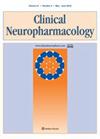Efficacy of Clonidine Adhesive Patch for Patients With Tourette Syndrome: A Randomized, Double-blind, Placebo-Controlled, Multicenter Clinical Trial.
IF 1.5
4区 医学
Q4 CLINICAL NEUROLOGY
引用次数: 0
Abstract
OBJECTIVE This study aimed to explore the efficacy of the clonidine adhesive patch for participants with Tourette syndrome (TS). METHODS This randomized, double-blind, placebo-controlled, multicenter phase IV clinical trial included participants with TS at 20 centers between May 2012 and March 2015. Treatment efficacy at week 8 was the primary outcome. The Clinical Global Impression-Severity scale and Improvement scale were the secondary endpoints. RESULTS This trial included 488 participants, with 121 participants in the 2.0-mg/wk group, 119 participants in the 1.5-mg/wk group, 126 participants in the 1.0-mg/wk group, and 122 participants in the placebo group. For Yale Global Tic Severity Scale score reduction rate, compared with the placebo group (39.60 ± 25.56), those of the 2.0-mg/wk group (63.21 ± 32.60) and the 1.5-mg/wk group (68.16 ± 25.88) were statistically significantly different (all P < 0.001). For total Yale Global Tic Severity Scale score, compared with the placebo group (17.0 ± 8.03), the score for the 2.0-mg/wk group was 9.9 ± 8.36 (P < 0.001); 1.5-mg/wk group, 9.6 ± 8.03 (P < 0.001); and 1.0-mg/wk group, 10.5 ± 9.28 (P < 0.001). The Clinical Global Impression-Severity scale and Improvement scale scores were statistically significantly different in the 3 clonidine (or experimental) groups compared with the placebo group (all P < 0.001). CONCLUSIONS Larger doses of the clonidine adhesive patch such as 1.5 and 2.0 mg/wk are effective in improving the symptoms and overall function of participants with TS.克洛尼丁胶粘贴对妥瑞症患者的疗效:随机、双盲、安慰剂对照、多中心临床试验。
目的本研究旨在探讨氯尼替胺胶贴对妥瑞症(TS)患者的疗效。方法这项随机、双盲、安慰剂对照的多中心 IV 期临床试验纳入了 2012 年 5 月至 2015 年 3 月期间 20 个中心的 TS 患者。第 8 周的疗效是主要结果。结果该试验纳入了488名参与者,其中2.0毫克/周组有121名参与者,1.5毫克/周组有119名参与者,1.0毫克/周组有126名参与者,安慰剂组有122名参与者。在耶鲁全球抽搐严重程度量表评分减少率方面,与安慰剂组(39.60 ± 25.56)相比,2.0 毫克/周组(63.21 ± 32.60)和 1.5 毫克/周组(68.16 ± 25.88)在统计学上有显著差异(均为 P <0.001)。在耶鲁全球抽搐严重程度量表总分方面,与安慰剂组(17.0 ± 8.03)相比,2.0 毫克/周组为 9.9 ± 8.36(P < 0.001);1.5 毫克/周组为 9.6 ± 8.03(P < 0.001);1.0 毫克/周组为 10.5 ± 9.28(P < 0.001)。与安慰剂组相比,3 个氯硝柳胺组(或实验组)的临床总体印象--严重程度量表和改善程度量表评分均有显著统计学差异(均 P < 0.001)。
本文章由计算机程序翻译,如有差异,请以英文原文为准。
求助全文
约1分钟内获得全文
求助全文
来源期刊

Clinical Neuropharmacology
医学-临床神经学
CiteScore
1.20
自引率
10.00%
发文量
63
审稿时长
6-12 weeks
期刊介绍:
Clinical Neuropharmacology is a peer-reviewed journal devoted to the pharmacology of the nervous system in its broadest sense. Coverage ranges from such basic aspects as mechanisms of action, structure-activity relationships, and drug metabolism and pharmacokinetics, to practical clinical problems such as drug interactions, drug toxicity, and therapy for specific syndromes and symptoms. The journal publishes original articles and brief reports, invited and submitted reviews, and letters to the editor. A regular feature is the Patient Management Series: in-depth case presentations with clinical questions and answers.
 求助内容:
求助内容: 应助结果提醒方式:
应助结果提醒方式:


